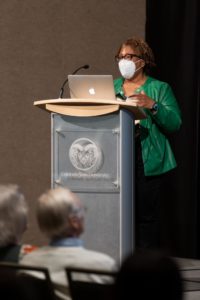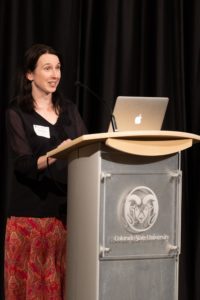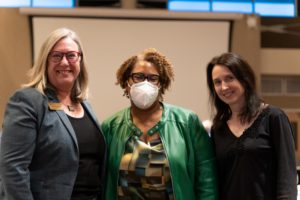 Henrika McCoy, Ph.D., Ruby Lee Piester Centennial Fellow in Services to Children and Youth and Associate Professor at the Steve Hicks School of Social Work, University of Texas at Austin visited the Colorado State University School of Social Work to share why having a personal lens for social justice and racial equity is imperative to social work research for the Fourth Biennial Brad Sheafor Lecture Series on April 10.
Henrika McCoy, Ph.D., Ruby Lee Piester Centennial Fellow in Services to Children and Youth and Associate Professor at the Steve Hicks School of Social Work, University of Texas at Austin visited the Colorado State University School of Social Work to share why having a personal lens for social justice and racial equity is imperative to social work research for the Fourth Biennial Brad Sheafor Lecture Series on April 10.
In her talk, titled The Research or the Researcher: Centering Racial Equity and Social Justice in One’s Work, McCoy shared how her experiences as a Black woman and social work practitioner have shaped her research agenda and led her to question how society and its social services are structured.
“My journey to get here was as a practitioner – seeing things that I didn’t understand or agree with,” McCoy said in her talk. “Being African American and living in neighborhoods with people who looked like me while regularly navigating multicultural environments provided me with an understanding and access not afforded to many which has greatly influenced my research trajectory.”
Educational contrasts
McCoy’s mother grew up during the Great Depression on the same street as Martin Luther King Jr. “I heard a lot about social justice from a very early age – it was expected that we learn about it in our community,” she reflected. Her mother was a schoolteacher with a master’s degree who taught in the same elementary school for over 35 years. McCoy said she “learned lots about what it means to be engaged in community” from her mother.
In contrast, McCoy’s father didn’t finish high school, but held the distinction in her eyes as “the smartest person I knew.” He also grew up in the south in a prior generation to her mother, and also learned the importance of community and modeled its value. Having two parents with vast differences in formal education, but so much in common in “life education” shaped how she sees the world.
McCoy’s intense educational journey started early including attending a multicultural elementary school with kids from vastly different backgrounds. “My school had neighborhood kids, kids from different countries such as Burma, Nigeria, India, and the Philippines, and children who were deaf or hard-of hearing. My worldview is informed by mish-mash of what I learned at home and what I saw in school,” she said.
“My mother changed my birth certificate when I was young to get me into school,” McCoy said. “I had been in school since the age of 2, and when she took me to enroll in first grade, they would not let me in – I was 4.
“So, she enrolled me in Montessori, altered my birth certificate, took me back to enroll in first grade, and they let me in!”
McCoy said she had “lots of access to education that my peers in the broader world didn’t have.”

Discovering social work
At 16, McCoy started attending Washington University in St. Louis, where she started off as a business major, but eventually graduated with degrees in sociology and African American studies. While in college, she volunteered at the YMCA and became a volunteer probation officer. “That really shaped how I saw the world,” she said.
McCoy’s turning point towards social work came after she took a cross-listed sociology/social work class her senior year on poverty in America with Mark Rank. “At that time, I was working on applications for graduate programs in industrial labor relations, and I took this class, and it changed my entire perspective on the world,” McCoy said. “I immediately switched and decided to apply to schools of social work. And here I stand!”
McCoy went from wanting to do some kind of negotiation, to thinking maybe there’s something I can do to change the world. “That’s what we want to do as social workers,” she said.
Seeing discrepancies
After completing her MSW and one of her field placements in a Philadelphia high school, McCoy said, “I kept seeing different places where people understood that race existed,” but, social work was experiencing a “colorblind moment, where ‘if we don’t pay attention, it won’t matter.’” The dissonance didn’t sit right with McCoy as an early-career practitioner. “That’s what I was learning at the time, and I thought, ‘Well, that doesn’t sound right to me.’”
Throughout McCoy’s career as a practitioner, she noticed that the families that looked like her didn’t have people who looked like them in the healthcare system, and wrestled with how that affected the individuals and families who were receiving care.

McCoy also found herself not agreeing with some diagnoses made by her psychiatrist colleagues. “What was being diagnosed, I didn’t agree with. I would see young black boys who are being diagnosed with oppositional defiant disorder and conduct disorder, and I was saying ‘that looks like depression to me,’” McCoy shared in her talk.
McCoy wasn’t just seeing misalignments in what she thought was best for her youth and families in the health care system, but the court system as well.
“I was taking kids back and forth to court, and not understanding why what I thought should be happening, wasn’t,” she said. So, she went to Loyola University and earned a Master of Jurisprudence in Child and Family Law.
These discrepancies were the foundation of McCoy’s Ph.D. dissertation, which she completed at the George Warren Brown School of Social Work at Washington University in St. Louis.
McCoy’s dissertation studied the effects of race on the MAYSI-2 screening tool, an instrument used to “identify feelings, thoughts or behaviors indicative of an acute emotional crisis requiring immediate action or a mental health disorder,” according to her presentation. As a youth enters the juvenile legal system, “it’s a screening tool to determine if they need further mental health assessment,” she said.
Her study added additional context to how and why Black and White youth perceive specific questions asked on the MAYSI-2 differently and posed that those differences could create disparate outcomes for youth based on their differing racial or cultural backgrounds.
“All of this is important when we think about how race plays into this, and then how do we make decisions about outcomes for youth,” McCoy said.
Engaging outside of research
McCoy’s intrinsic curiosity is imperative to her research. In addition to her own experience and research, McCoy loves to engage with contemporary books, podcasts, TV shows, and other media that help her see subject matter around race and social justice in a different context.
A deeper understanding of the world “can’t passively come to you, you have to look for it,” she said. McCoy enjoys HBO shows like The Wire, podcasts like In the Dark , and books from authors such as Derrick Bell as ways to broaden her perspective outside of her work and circles. “It doesn’t always have to be so serious, but you’re still getting a lesson out of it.”
Lessons for future social workers
“Think about how intersectionality influences our work,” she shared. “I want to make sure my expectations and desires really focus on what other people need.”
McCoy sees social work research as a tool to move the needle forward. “Use [your] voice to share, sometimes gently and sometimes not so gently,” she said.
Since the pandemic, McCoy has leaned into sharing her voice as a social work researcher in op-eds in national outlets, speaking engagements and panel discussions, and more advocacy-oriented journal publications.
Black people are not victims
To close her talk, McCoy shared the final words of her article that garnered vast engagement from around the country in 2020:
“Black people are not victims. We have survived in this country despite the Middle Passage, enslavement, and the numerous other attempts to make us the footstool that everyone who is not Black or American Indian/Native American (survivors of numerous attempts at Indigenous erasure) has the privilege of using to reach a ladder so they can climb unfettered and accomplish the American dream. If you are silent, you are complicit. If you fail to demand change, you are giving approval. If you fail to demand justice, just know, you are guilty, and you support injustice.”
Dr. McCoy’s full talk can be found here on YouTube.
About the Brad Sheafor Lecture Series
Sheafor, professor emeritus in the School of Social Work, dedicated 38 years to Colorado State University and the School. The Brad Sheafor Lecture Series in Social Work honors his leadership and contributions to social work, both locally and nationally. Sheafor was featured as part of the College of Health and Human Sciences Legacies Project and you can learn more about him on his Legacies webpage.
The School of Social Work is part of CSU’s College of Health and Human Sciences.